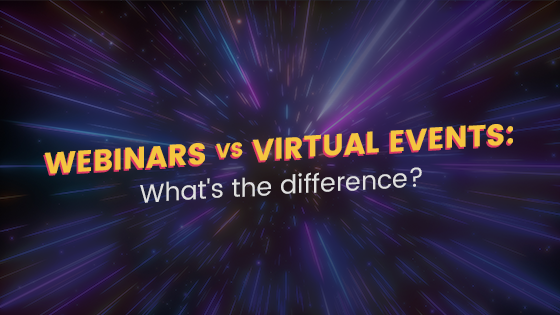


Webinars vs Virtual Events: what's the difference?




I know what you're thinking. Not another piece of content on webinars.
But, whilst we all might be struggling with webinar fatigue and getting sick of seeing our own faces (and anybody else's for that matter) through a screen, it's something that's not going away anytime soon.
With companies like HubSpot making all their planned physical events virtual until at least the end of 2020, there's not much hope of an in-person event even for the most optimistic of us.
Despite the growing unrest as many people have now worked from home for almost half a year, many marketers still don't feel the time is right to return to the landscape of physical events. Marketing Land recently conducted a survey that revealed 70% of marketers wouldn't attend an in-person event until the production of a Covid-19 vaccine, which we all know could be very far off, if ever.
But even though we all like to complain about the 100th Zoom call of the day and the common misuse of the mute button, 75% of marketers said they were satisfied with their experiences of virtual events and webinars.
So considering the online event world is here to stay, we thought we'd discuss the difference between webinars and virtual events and determine which is the better option.
What's the difference?
There's a lot of different names out there for what's essentially a Zoom call, from webinars and virtual events to online conferences and workshops. But what do they all mean and is there actually a difference?
Whilst it's obvious that some companies may just use different titles to sound better than their competitors, there is actually some relevant differences that can help you position your event and target the right people.
Webinars
First up, webinars. This time last year the word webinar meant one hour of un-engaging information overload that you'd only join if you had a REALLY quiet week. But with some platforms reporting a 330% jump in webinars hosted, it's clear that this is now something quite different and definitely something that deserves our attention.
Traditionally, webinars tend to be an expert speaker running through a presentation deck. There's normally a large number of attendees and participants can't usually be seen or heard.
The idea is that you sit back and listen. Maybe have one on in the background whilst you work and potentially shoot a couple of questions into the Q&A panel at the end.
Whilst it's clear to see how webinars got their (what's a nicer word for boring?) reputation, this format can provide value for its audience. If your target audience is looking for expert knowledge on a specific topic, then an industry specialist 1-hour talk can be the perfect learning platform.
And with everyone stuck at home, webinars are fast becoming one of the best channels for learning and staying connected.
Virtual events
In comparison, virtual events set out to emulate the physical event with all the engagement, interaction and involvement that you would find at an in-person session.
But what does that look like in practice?
There's normally a smaller number of attendees and it's encouraged for participants to have their video turned on.
Questions are generally asked throughout and encouraged to be asked out loud to increase the level of engagement and personability.
There are many use cases where a virtual event might be more fitting than a webinar. To best understand where a virtual event might be better suited you first have to look at your goals. What are you hoping to achieve from this event? If the answer is to create high levels of engagement, build a community or initiate networking opportunities, then you should be considering a virtual event. If you're more focused on sharing expert information and knowledge or having high attendance levels, a webinar would be the more appropriate choice.
One use-case of the virtual event that we've seen work best is the HubSpot User Groups. Pre-Covid, these were in-person events all across the world that aimed to create and build a community of HubSpot users in local areas. There was often an opportunity to network and get 1-on-1 support and questions answered. With these goals in mind, it didn't seem right to run these as webinars when the pandemic hit.
We recently hosted the Virtual Leeds HUG Event and whilst it required a willingness to adjust from our attendees, we were able to achieve the same high levels of engagement, support and networking that we did at our previous physical events.
Summary
So to answer the question of 'which is the better option?' you need to look at your specific business and, as with all marketing, your target audience.
You might be focusing on building communities and starting discussions between fellow industry experts, in which case you'll need an engaging virtual event to share information. Or, you might be established for your wealth of expert knowledge that people want to listen to and learn from, meaning a webinar would be more suitable.
Either way, remember that you're running these webinars and virtual events to add value to your audience. Think about what they want to get out of the session and let that drive your decisions.
Other options including virtual summits, online conferences and workshops can all help you get the most out of your event marketing in 2020.
I'll finish with a value we live by here at Six & Flow - be playful.
Try things out and see what works for your business and your audience. As we begin to enter a post-Covid world, it's likely things will continue to change and the best way you can adapt is to try out all the options and know what works and when.
If you're looking at making the shift from physical to virtual, find out how we moved to online events.








